Drug Study on Dexamethasone in OB/GYNE Nursing Rotation
VerifiedAdded on 2021/08/19
|9
|2263
|73
Homework Assignment
AI Summary
This document is a comprehensive drug study on Dexamethasone, a long-acting glucocorticoid, detailing its classification, mode of action, and therapeutic effects. It provides extensive information on dosage and routes of administration for various conditions, including anti-inflammatory uses, cerebral edema, and nausea/vomiting related to chemotherapy. The study thoroughly outlines indications, contraindications, and potential side effects, encompassing CNS, cardiovascular, endocrine, and other systemic effects. Furthermore, it explores significant drug interactions, including those with aminoglutethimide, antibiotics, and anticoagulants, and offers detailed nursing responsibilities, such as monitoring patients for specific adverse effects and providing patient education on drug administration and potential complications. The study is well-referenced, citing multiple drug handbooks and resources.
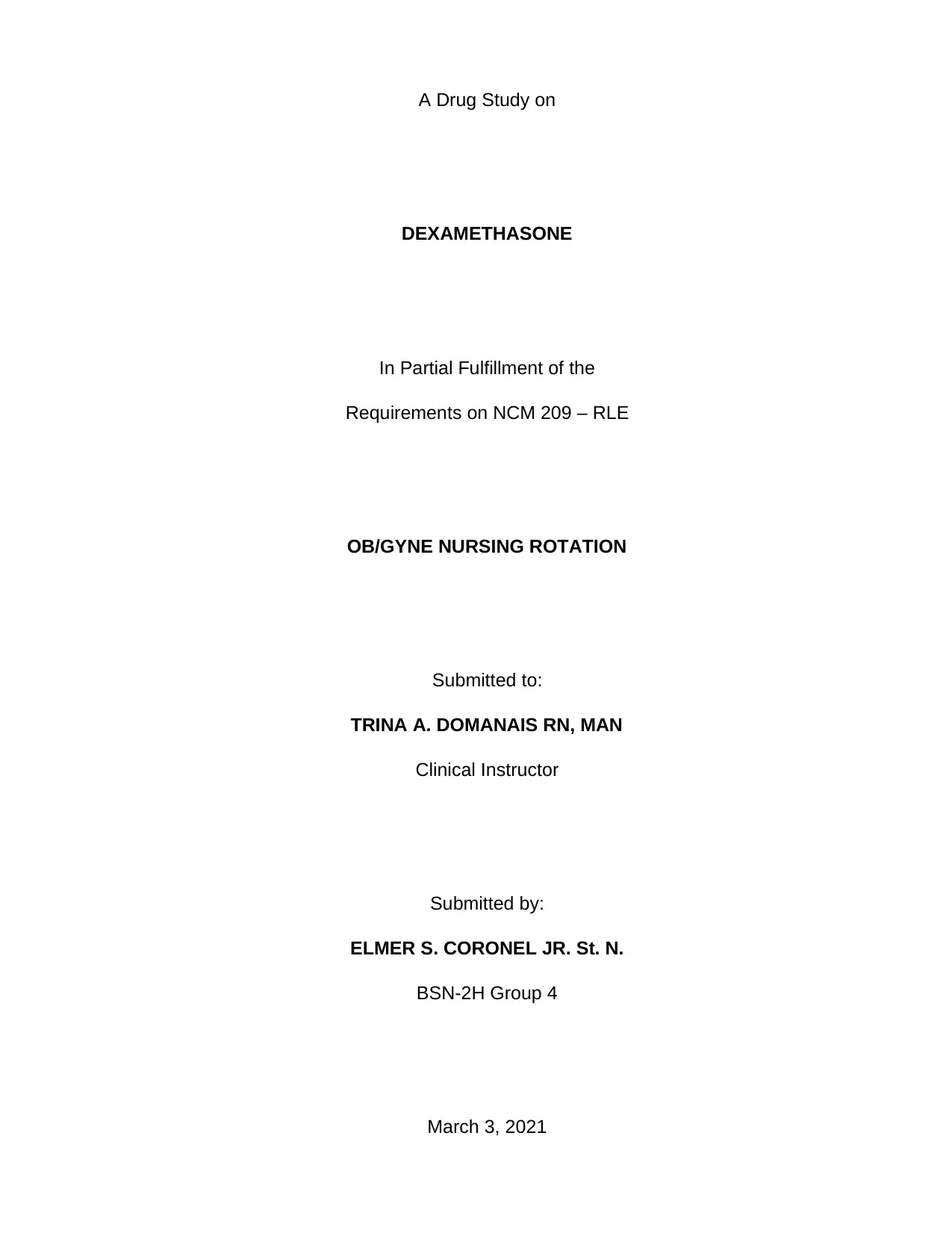
A Drug Study on
DEXAMETHASONE
In Partial Fulfillment of the
Requirements on NCM 209 – RLE
OB/GYNE NURSING ROTATION
Submitted to:
TRINA A. DOMANAIS RN, MAN
Clinical Instructor
Submitted by:
ELMER S. CORONEL JR. St. N.
BSN-2H Group 4
March 3, 2021
DEXAMETHASONE
In Partial Fulfillment of the
Requirements on NCM 209 – RLE
OB/GYNE NURSING ROTATION
Submitted to:
TRINA A. DOMANAIS RN, MAN
Clinical Instructor
Submitted by:
ELMER S. CORONEL JR. St. N.
BSN-2H Group 4
March 3, 2021
Paraphrase This Document
Need a fresh take? Get an instant paraphrase of this document with our AI Paraphraser
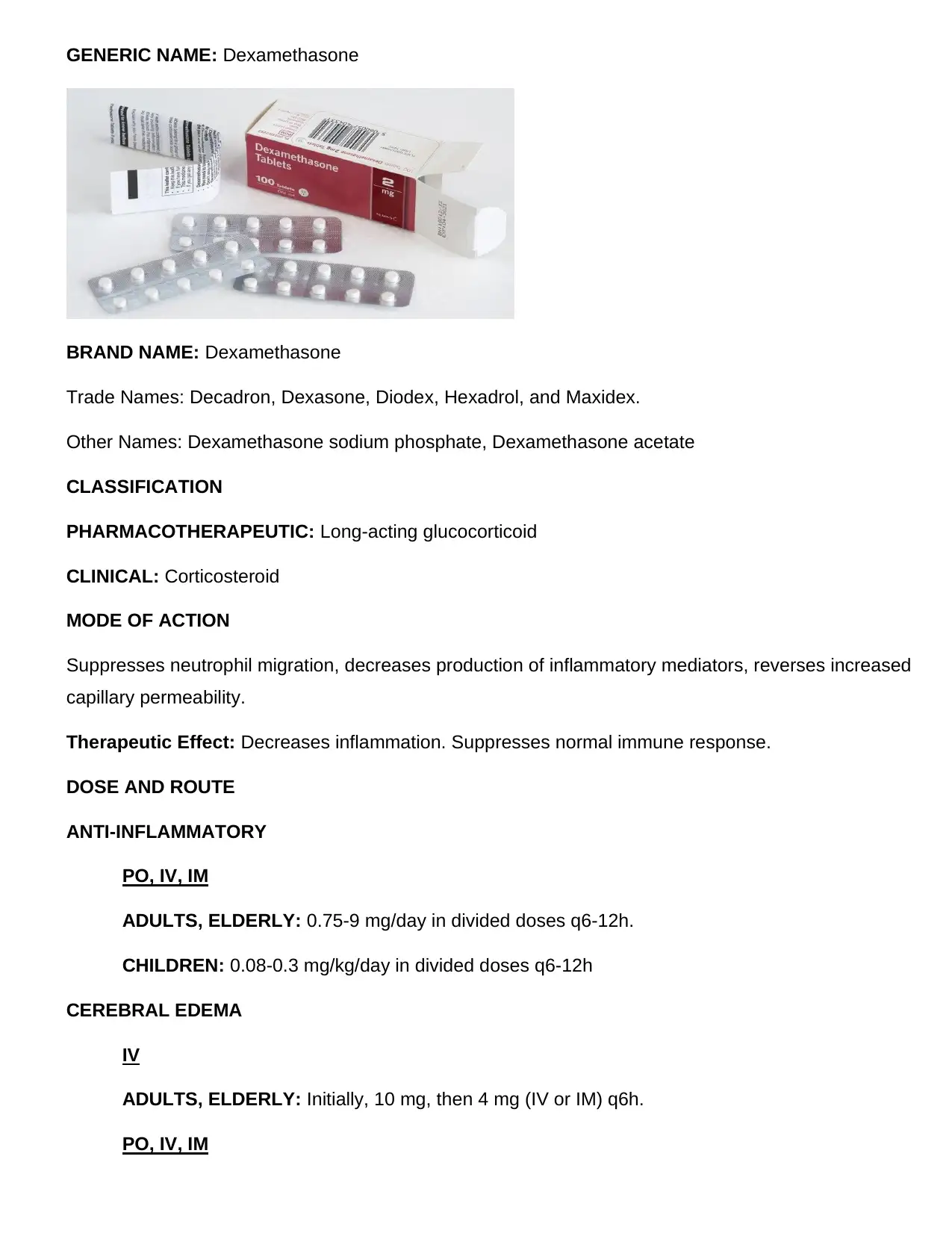
GENERIC NAME: Dexamethasone
BRAND NAME: Dexamethasone
Trade Names: Decadron, Dexasone, Diodex, Hexadrol, and Maxidex.
Other Names: Dexamethasone sodium phosphate, Dexamethasone acetate
CLASSIFICATION
PHARMACOTHERAPEUTIC: Long-acting glucocorticoid
CLINICAL: Corticosteroid
MODE OF ACTION
Suppresses neutrophil migration, decreases production of inflammatory mediators, reverses increased
capillary permeability.
Therapeutic Effect: Decreases inflammation. Suppresses normal immune response.
DOSE AND ROUTE
ANTI-INFLAMMATORY
PO, IV, IM
ADULTS, ELDERLY: 0.75-9 mg/day in divided doses q6-12h.
CHILDREN: 0.08-0.3 mg/kg/day in divided doses q6-12h
CEREBRAL EDEMA
IV
ADULTS, ELDERLY: Initially, 10 mg, then 4 mg (IV or IM) q6h.
PO, IV, IM
BRAND NAME: Dexamethasone
Trade Names: Decadron, Dexasone, Diodex, Hexadrol, and Maxidex.
Other Names: Dexamethasone sodium phosphate, Dexamethasone acetate
CLASSIFICATION
PHARMACOTHERAPEUTIC: Long-acting glucocorticoid
CLINICAL: Corticosteroid
MODE OF ACTION
Suppresses neutrophil migration, decreases production of inflammatory mediators, reverses increased
capillary permeability.
Therapeutic Effect: Decreases inflammation. Suppresses normal immune response.
DOSE AND ROUTE
ANTI-INFLAMMATORY
PO, IV, IM
ADULTS, ELDERLY: 0.75-9 mg/day in divided doses q6-12h.
CHILDREN: 0.08-0.3 mg/kg/day in divided doses q6-12h
CEREBRAL EDEMA
IV
ADULTS, ELDERLY: Initially, 10 mg, then 4 mg (IV or IM) q6h.
PO, IV, IM
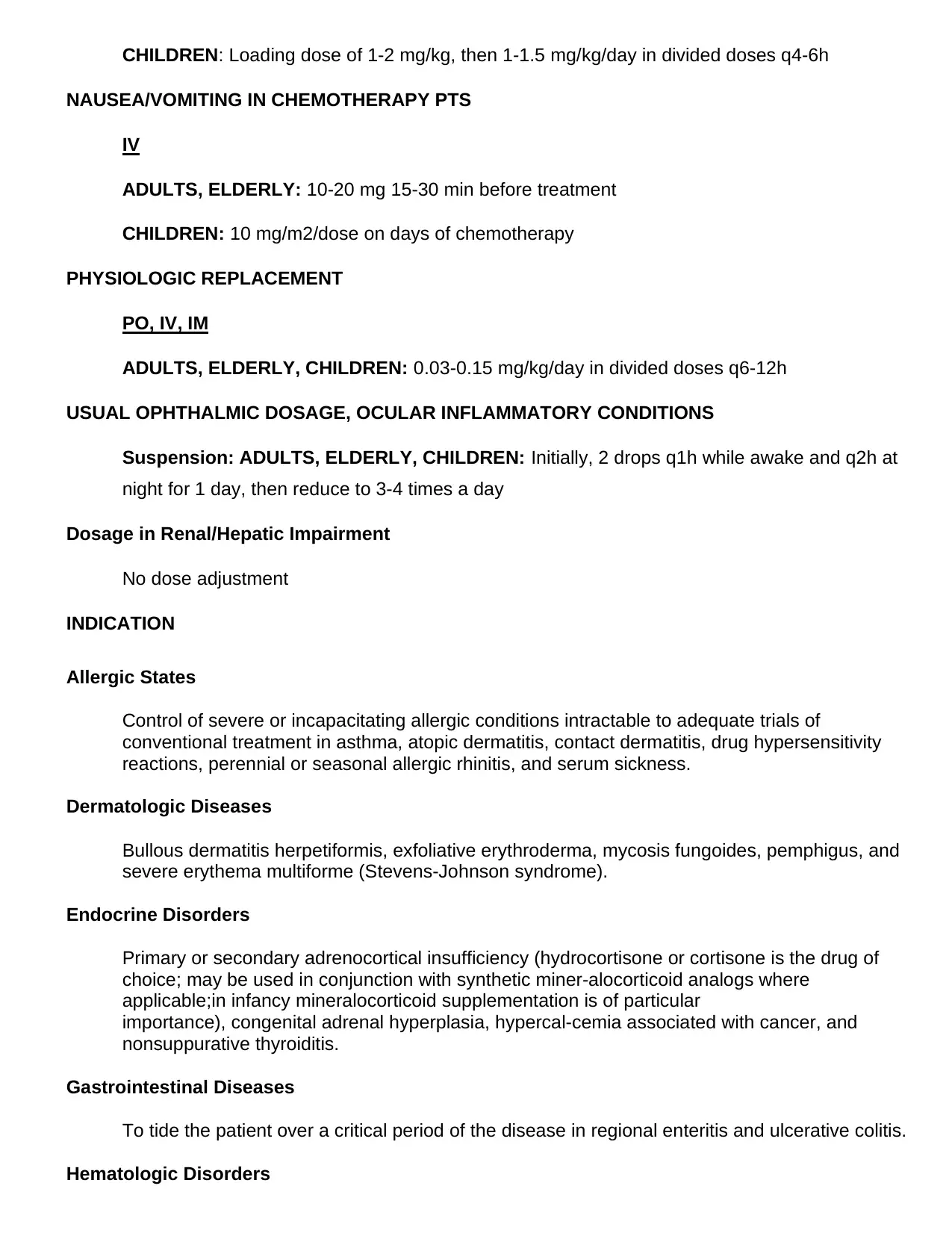
CHILDREN: Loading dose of 1-2 mg/kg, then 1-1.5 mg/kg/day in divided doses q4-6h
NAUSEA/VOMITING IN CHEMOTHERAPY PTS
IV
ADULTS, ELDERLY: 10-20 mg 15-30 min before treatment
CHILDREN: 10 mg/m2/dose on days of chemotherapy
PHYSIOLOGIC REPLACEMENT
PO, IV, IM
ADULTS, ELDERLY, CHILDREN: 0.03-0.15 mg/kg/day in divided doses q6-12h
USUAL OPHTHALMIC DOSAGE, OCULAR INFLAMMATORY CONDITIONS
Suspension: ADULTS, ELDERLY, CHILDREN: Initially, 2 drops q1h while awake and q2h at
night for 1 day, then reduce to 3-4 times a day
Dosage in Renal/Hepatic Impairment
No dose adjustment
INDICATION
Allergic States
Control of severe or incapacitating allergic conditions intractable to adequate trials of
conventional treatment in asthma, atopic dermatitis, contact dermatitis, drug hypersensitivity
reactions, perennial or seasonal allergic rhinitis, and serum sickness.
Dermatologic Diseases
Bullous dermatitis herpetiformis, exfoliative erythroderma, mycosis fungoides, pemphigus, and
severe erythema multiforme (Stevens-Johnson syndrome).
Endocrine Disorders
Primary or secondary adrenocortical insufficiency (hydrocortisone or cortisone is the drug of
choice; may be used in conjunction with synthetic miner-alocorticoid analogs where
applicable;in infancy mineralocorticoid supplementation is of particular
importance), congenital adrenal hyperplasia, hypercal-cemia associated with cancer, and
nonsuppurative thyroiditis.
Gastrointestinal Diseases
To tide the patient over a critical period of the disease in regional enteritis and ulcerative colitis.
Hematologic Disorders
NAUSEA/VOMITING IN CHEMOTHERAPY PTS
IV
ADULTS, ELDERLY: 10-20 mg 15-30 min before treatment
CHILDREN: 10 mg/m2/dose on days of chemotherapy
PHYSIOLOGIC REPLACEMENT
PO, IV, IM
ADULTS, ELDERLY, CHILDREN: 0.03-0.15 mg/kg/day in divided doses q6-12h
USUAL OPHTHALMIC DOSAGE, OCULAR INFLAMMATORY CONDITIONS
Suspension: ADULTS, ELDERLY, CHILDREN: Initially, 2 drops q1h while awake and q2h at
night for 1 day, then reduce to 3-4 times a day
Dosage in Renal/Hepatic Impairment
No dose adjustment
INDICATION
Allergic States
Control of severe or incapacitating allergic conditions intractable to adequate trials of
conventional treatment in asthma, atopic dermatitis, contact dermatitis, drug hypersensitivity
reactions, perennial or seasonal allergic rhinitis, and serum sickness.
Dermatologic Diseases
Bullous dermatitis herpetiformis, exfoliative erythroderma, mycosis fungoides, pemphigus, and
severe erythema multiforme (Stevens-Johnson syndrome).
Endocrine Disorders
Primary or secondary adrenocortical insufficiency (hydrocortisone or cortisone is the drug of
choice; may be used in conjunction with synthetic miner-alocorticoid analogs where
applicable;in infancy mineralocorticoid supplementation is of particular
importance), congenital adrenal hyperplasia, hypercal-cemia associated with cancer, and
nonsuppurative thyroiditis.
Gastrointestinal Diseases
To tide the patient over a critical period of the disease in regional enteritis and ulcerative colitis.
Hematologic Disorders
⊘ This is a preview!⊘
Do you want full access?
Subscribe today to unlock all pages.

Trusted by 1+ million students worldwide
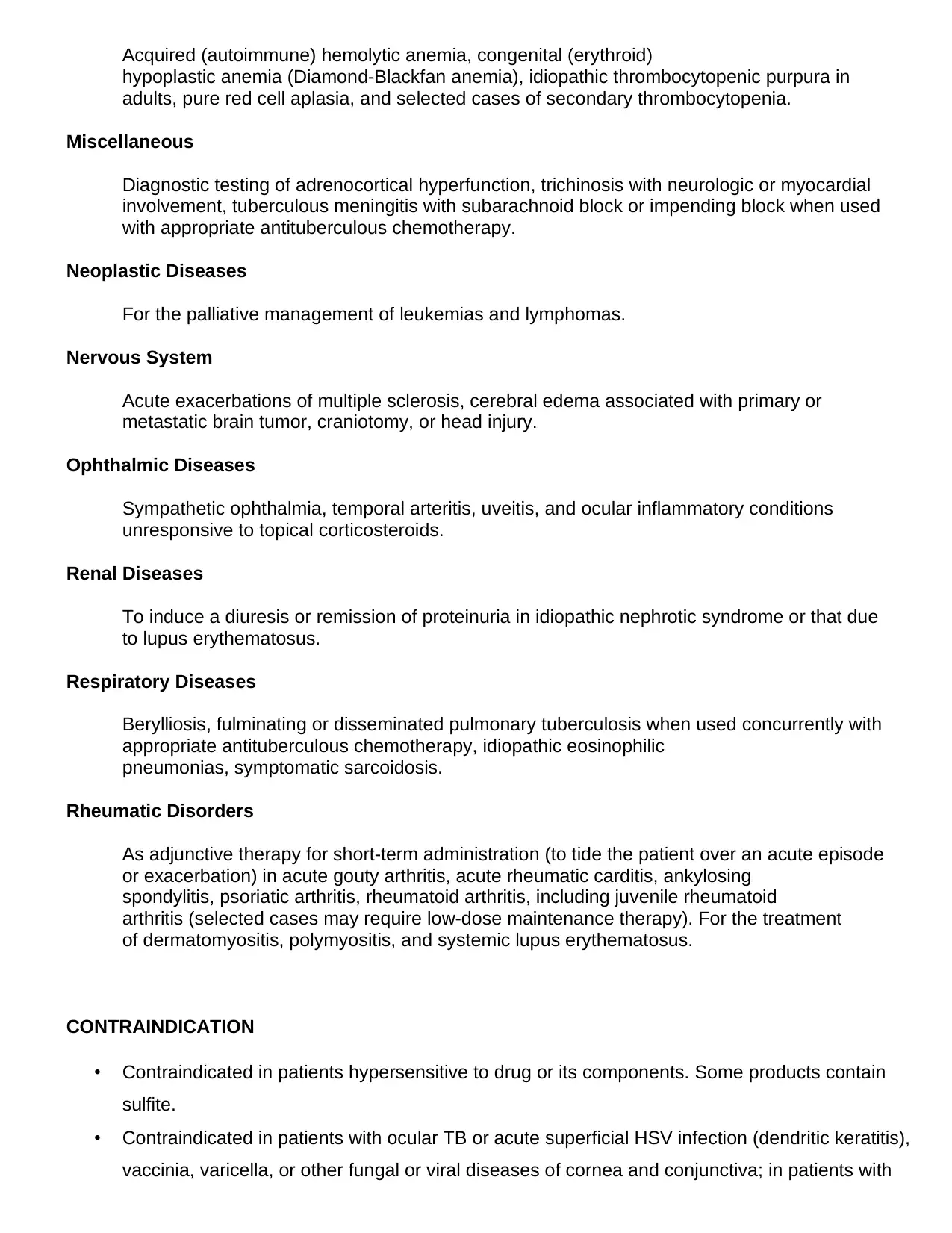
Acquired (autoimmune) hemolytic anemia, congenital (erythroid)
hypoplastic anemia (Diamond-Blackfan anemia), idiopathic thrombocytopenic purpura in
adults, pure red cell aplasia, and selected cases of secondary thrombocytopenia.
Miscellaneous
Diagnostic testing of adrenocortical hyperfunction, trichinosis with neurologic or myocardial
involvement, tuberculous meningitis with subarachnoid block or impending block when used
with appropriate antituberculous chemotherapy.
Neoplastic Diseases
For the palliative management of leukemias and lymphomas.
Nervous System
Acute exacerbations of multiple sclerosis, cerebral edema associated with primary or
metastatic brain tumor, craniotomy, or head injury.
Ophthalmic Diseases
Sympathetic ophthalmia, temporal arteritis, uveitis, and ocular inflammatory conditions
unresponsive to topical corticosteroids.
Renal Diseases
To induce a diuresis or remission of proteinuria in idiopathic nephrotic syndrome or that due
to lupus erythematosus.
Respiratory Diseases
Berylliosis, fulminating or disseminated pulmonary tuberculosis when used concurrently with
appropriate antituberculous chemotherapy, idiopathic eosinophilic
pneumonias, symptomatic sarcoidosis.
Rheumatic Disorders
As adjunctive therapy for short-term administration (to tide the patient over an acute episode
or exacerbation) in acute gouty arthritis, acute rheumatic carditis, ankylosing
spondylitis, psoriatic arthritis, rheumatoid arthritis, including juvenile rheumatoid
arthritis (selected cases may require low-dose maintenance therapy). For the treatment
of dermatomyositis, polymyositis, and systemic lupus erythematosus.
CONTRAINDICATION
• Contraindicated in patients hypersensitive to drug or its components. Some products contain
sulfite.
• Contraindicated in patients with ocular TB or acute superficial HSV infection (dendritic keratitis),
vaccinia, varicella, or other fungal or viral diseases of cornea and conjunctiva; in patients with
hypoplastic anemia (Diamond-Blackfan anemia), idiopathic thrombocytopenic purpura in
adults, pure red cell aplasia, and selected cases of secondary thrombocytopenia.
Miscellaneous
Diagnostic testing of adrenocortical hyperfunction, trichinosis with neurologic or myocardial
involvement, tuberculous meningitis with subarachnoid block or impending block when used
with appropriate antituberculous chemotherapy.
Neoplastic Diseases
For the palliative management of leukemias and lymphomas.
Nervous System
Acute exacerbations of multiple sclerosis, cerebral edema associated with primary or
metastatic brain tumor, craniotomy, or head injury.
Ophthalmic Diseases
Sympathetic ophthalmia, temporal arteritis, uveitis, and ocular inflammatory conditions
unresponsive to topical corticosteroids.
Renal Diseases
To induce a diuresis or remission of proteinuria in idiopathic nephrotic syndrome or that due
to lupus erythematosus.
Respiratory Diseases
Berylliosis, fulminating or disseminated pulmonary tuberculosis when used concurrently with
appropriate antituberculous chemotherapy, idiopathic eosinophilic
pneumonias, symptomatic sarcoidosis.
Rheumatic Disorders
As adjunctive therapy for short-term administration (to tide the patient over an acute episode
or exacerbation) in acute gouty arthritis, acute rheumatic carditis, ankylosing
spondylitis, psoriatic arthritis, rheumatoid arthritis, including juvenile rheumatoid
arthritis (selected cases may require low-dose maintenance therapy). For the treatment
of dermatomyositis, polymyositis, and systemic lupus erythematosus.
CONTRAINDICATION
• Contraindicated in patients hypersensitive to drug or its components. Some products contain
sulfite.
• Contraindicated in patients with ocular TB or acute superficial HSV infection (dendritic keratitis),
vaccinia, varicella, or other fungal or viral diseases of cornea and conjunctiva; in patients with
Paraphrase This Document
Need a fresh take? Get an instant paraphrase of this document with our AI Paraphraser
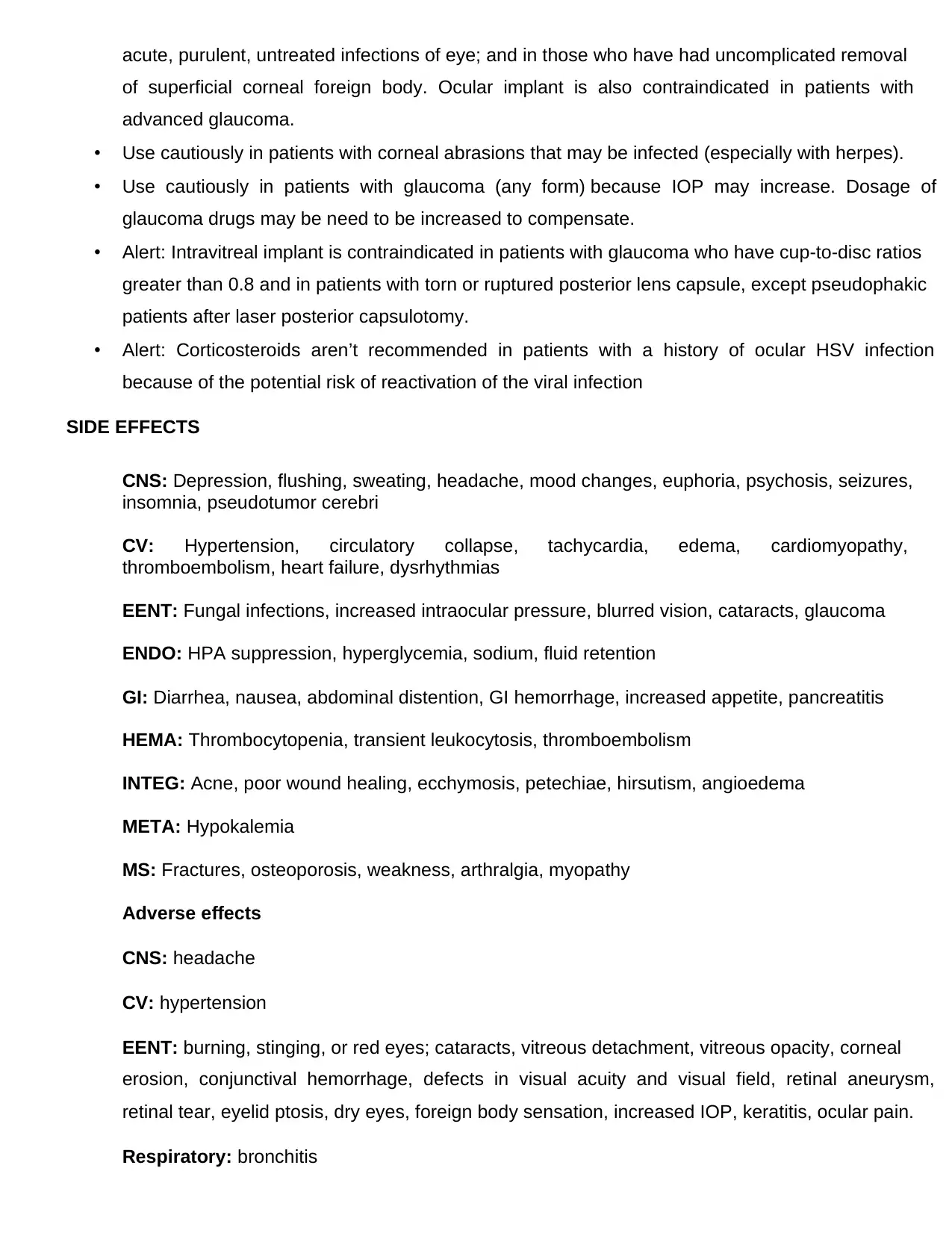
acute, purulent, untreated infections of eye; and in those who have had uncomplicated removal
of superficial corneal foreign body. Ocular implant is also contraindicated in patients with
advanced glaucoma.
• Use cautiously in patients with corneal abrasions that may be infected (especially with herpes).
• Use cautiously in patients with glaucoma (any form) because IOP may increase. Dosage of
glaucoma drugs may be need to be increased to compensate.
• Alert: Intravitreal implant is contraindicated in patients with glaucoma who have cup-to-disc ratios
greater than 0.8 and in patients with torn or ruptured posterior lens capsule, except pseudophakic
patients after laser posterior capsulotomy.
• Alert: Corticosteroids aren’t recommended in patients with a history of ocular HSV infection
because of the potential risk of reactivation of the viral infection
SIDE EFFECTS
CNS: Depression, flushing, sweating, headache, mood changes, euphoria, psychosis, seizures,
insomnia, pseudotumor cerebri
CV: Hypertension, circulatory collapse, tachycardia, edema, cardiomyopathy,
thromboembolism, heart failure, dysrhythmias
EENT: Fungal infections, increased intraocular pressure, blurred vision, cataracts, glaucoma
ENDO: HPA suppression, hyperglycemia, sodium, fluid retention
GI: Diarrhea, nausea, abdominal distention, GI hemorrhage, increased appetite, pancreatitis
HEMA: Thrombocytopenia, transient leukocytosis, thromboembolism
INTEG: Acne, poor wound healing, ecchymosis, petechiae, hirsutism, angioedema
META: Hypokalemia
MS: Fractures, osteoporosis, weakness, arthralgia, myopathy
Adverse effects
CNS: headache
CV: hypertension
EENT: burning, stinging, or red eyes; cataracts, vitreous detachment, vitreous opacity, corneal
erosion, conjunctival hemorrhage, defects in visual acuity and visual field, retinal aneurysm,
retinal tear, eyelid ptosis, dry eyes, foreign body sensation, increased IOP, keratitis, ocular pain.
Respiratory: bronchitis
of superficial corneal foreign body. Ocular implant is also contraindicated in patients with
advanced glaucoma.
• Use cautiously in patients with corneal abrasions that may be infected (especially with herpes).
• Use cautiously in patients with glaucoma (any form) because IOP may increase. Dosage of
glaucoma drugs may be need to be increased to compensate.
• Alert: Intravitreal implant is contraindicated in patients with glaucoma who have cup-to-disc ratios
greater than 0.8 and in patients with torn or ruptured posterior lens capsule, except pseudophakic
patients after laser posterior capsulotomy.
• Alert: Corticosteroids aren’t recommended in patients with a history of ocular HSV infection
because of the potential risk of reactivation of the viral infection
SIDE EFFECTS
CNS: Depression, flushing, sweating, headache, mood changes, euphoria, psychosis, seizures,
insomnia, pseudotumor cerebri
CV: Hypertension, circulatory collapse, tachycardia, edema, cardiomyopathy,
thromboembolism, heart failure, dysrhythmias
EENT: Fungal infections, increased intraocular pressure, blurred vision, cataracts, glaucoma
ENDO: HPA suppression, hyperglycemia, sodium, fluid retention
GI: Diarrhea, nausea, abdominal distention, GI hemorrhage, increased appetite, pancreatitis
HEMA: Thrombocytopenia, transient leukocytosis, thromboembolism
INTEG: Acne, poor wound healing, ecchymosis, petechiae, hirsutism, angioedema
META: Hypokalemia
MS: Fractures, osteoporosis, weakness, arthralgia, myopathy
Adverse effects
CNS: headache
CV: hypertension
EENT: burning, stinging, or red eyes; cataracts, vitreous detachment, vitreous opacity, corneal
erosion, conjunctival hemorrhage, defects in visual acuity and visual field, retinal aneurysm,
retinal tear, eyelid ptosis, dry eyes, foreign body sensation, increased IOP, keratitis, ocular pain.
Respiratory: bronchitis
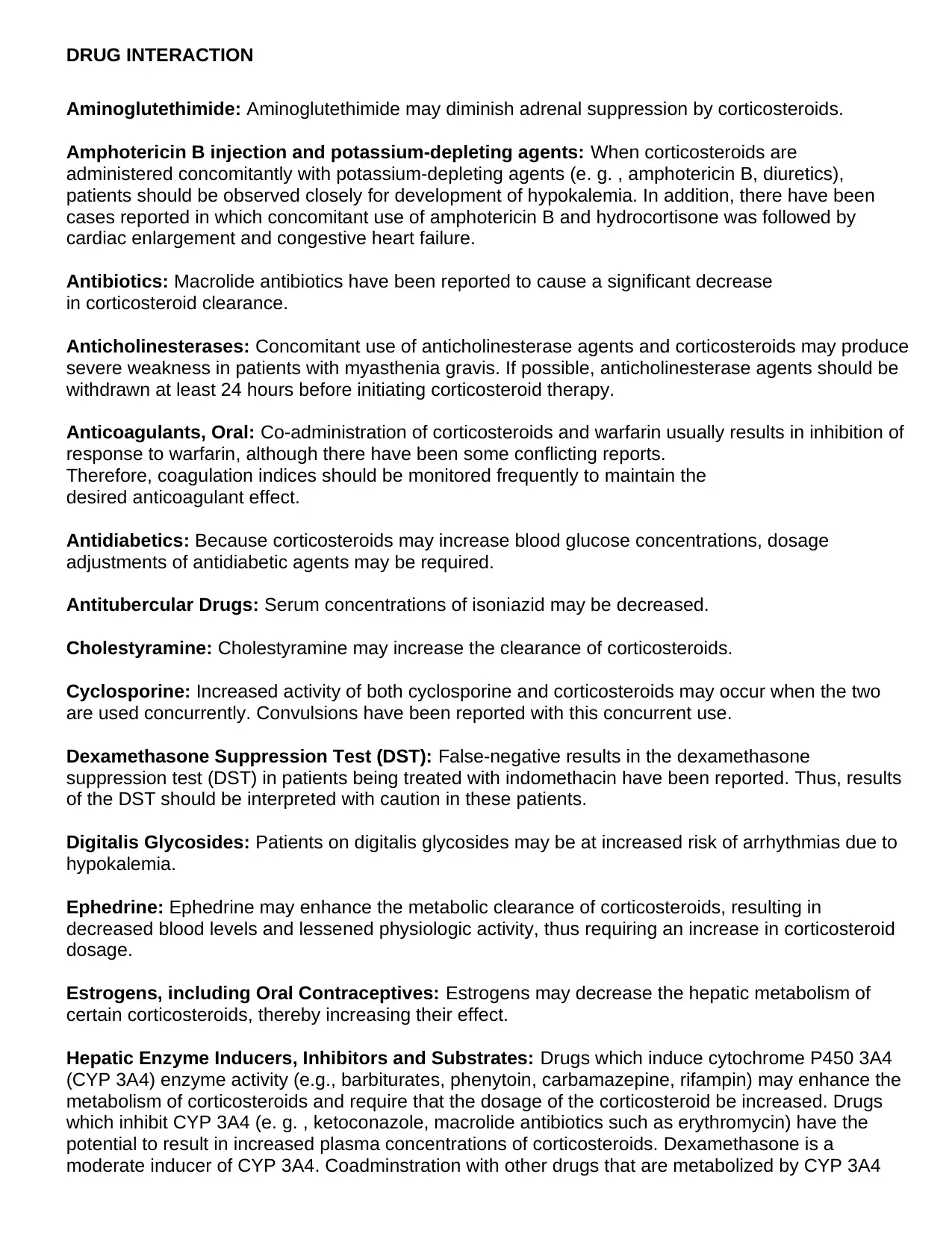
DRUG INTERACTION
Aminoglutethimide: Aminoglutethimide may diminish adrenal suppression by corticosteroids.
Amphotericin B injection and potassium-depleting agents: When corticosteroids are
administered concomitantly with potassium-depleting agents (e. g. , amphotericin B, diuretics),
patients should be observed closely for development of hypokalemia. In addition, there have been
cases reported in which concomitant use of amphotericin B and hydrocortisone was followed by
cardiac enlargement and congestive heart failure.
Antibiotics: Macrolide antibiotics have been reported to cause a significant decrease
in corticosteroid clearance.
Anticholinesterases: Concomitant use of anticholinesterase agents and corticosteroids may produce
severe weakness in patients with myasthenia gravis. If possible, anticholinesterase agents should be
withdrawn at least 24 hours before initiating corticosteroid therapy.
Anticoagulants, Oral: Co-administration of corticosteroids and warfarin usually results in inhibition of
response to warfarin, although there have been some conflicting reports.
Therefore, coagulation indices should be monitored frequently to maintain the
desired anticoagulant effect.
Antidiabetics: Because corticosteroids may increase blood glucose concentrations, dosage
adjustments of antidiabetic agents may be required.
Antitubercular Drugs: Serum concentrations of isoniazid may be decreased.
Cholestyramine: Cholestyramine may increase the clearance of corticosteroids.
Cyclosporine: Increased activity of both cyclosporine and corticosteroids may occur when the two
are used concurrently. Convulsions have been reported with this concurrent use.
Dexamethasone Suppression Test (DST): False-negative results in the dexamethasone
suppression test (DST) in patients being treated with indomethacin have been reported. Thus, results
of the DST should be interpreted with caution in these patients.
Digitalis Glycosides: Patients on digitalis glycosides may be at increased risk of arrhythmias due to
hypokalemia.
Ephedrine: Ephedrine may enhance the metabolic clearance of corticosteroids, resulting in
decreased blood levels and lessened physiologic activity, thus requiring an increase in corticosteroid
dosage.
Estrogens, including Oral Contraceptives: Estrogens may decrease the hepatic metabolism of
certain corticosteroids, thereby increasing their effect.
Hepatic Enzyme Inducers, Inhibitors and Substrates: Drugs which induce cytochrome P450 3A4
(CYP 3A4) enzyme activity (e.g., barbiturates, phenytoin, carbamazepine, rifampin) may enhance the
metabolism of corticosteroids and require that the dosage of the corticosteroid be increased. Drugs
which inhibit CYP 3A4 (e. g. , ketoconazole, macrolide antibiotics such as erythromycin) have the
potential to result in increased plasma concentrations of corticosteroids. Dexamethasone is a
moderate inducer of CYP 3A4. Coadminstration with other drugs that are metabolized by CYP 3A4
Aminoglutethimide: Aminoglutethimide may diminish adrenal suppression by corticosteroids.
Amphotericin B injection and potassium-depleting agents: When corticosteroids are
administered concomitantly with potassium-depleting agents (e. g. , amphotericin B, diuretics),
patients should be observed closely for development of hypokalemia. In addition, there have been
cases reported in which concomitant use of amphotericin B and hydrocortisone was followed by
cardiac enlargement and congestive heart failure.
Antibiotics: Macrolide antibiotics have been reported to cause a significant decrease
in corticosteroid clearance.
Anticholinesterases: Concomitant use of anticholinesterase agents and corticosteroids may produce
severe weakness in patients with myasthenia gravis. If possible, anticholinesterase agents should be
withdrawn at least 24 hours before initiating corticosteroid therapy.
Anticoagulants, Oral: Co-administration of corticosteroids and warfarin usually results in inhibition of
response to warfarin, although there have been some conflicting reports.
Therefore, coagulation indices should be monitored frequently to maintain the
desired anticoagulant effect.
Antidiabetics: Because corticosteroids may increase blood glucose concentrations, dosage
adjustments of antidiabetic agents may be required.
Antitubercular Drugs: Serum concentrations of isoniazid may be decreased.
Cholestyramine: Cholestyramine may increase the clearance of corticosteroids.
Cyclosporine: Increased activity of both cyclosporine and corticosteroids may occur when the two
are used concurrently. Convulsions have been reported with this concurrent use.
Dexamethasone Suppression Test (DST): False-negative results in the dexamethasone
suppression test (DST) in patients being treated with indomethacin have been reported. Thus, results
of the DST should be interpreted with caution in these patients.
Digitalis Glycosides: Patients on digitalis glycosides may be at increased risk of arrhythmias due to
hypokalemia.
Ephedrine: Ephedrine may enhance the metabolic clearance of corticosteroids, resulting in
decreased blood levels and lessened physiologic activity, thus requiring an increase in corticosteroid
dosage.
Estrogens, including Oral Contraceptives: Estrogens may decrease the hepatic metabolism of
certain corticosteroids, thereby increasing their effect.
Hepatic Enzyme Inducers, Inhibitors and Substrates: Drugs which induce cytochrome P450 3A4
(CYP 3A4) enzyme activity (e.g., barbiturates, phenytoin, carbamazepine, rifampin) may enhance the
metabolism of corticosteroids and require that the dosage of the corticosteroid be increased. Drugs
which inhibit CYP 3A4 (e. g. , ketoconazole, macrolide antibiotics such as erythromycin) have the
potential to result in increased plasma concentrations of corticosteroids. Dexamethasone is a
moderate inducer of CYP 3A4. Coadminstration with other drugs that are metabolized by CYP 3A4
⊘ This is a preview!⊘
Do you want full access?
Subscribe today to unlock all pages.

Trusted by 1+ million students worldwide
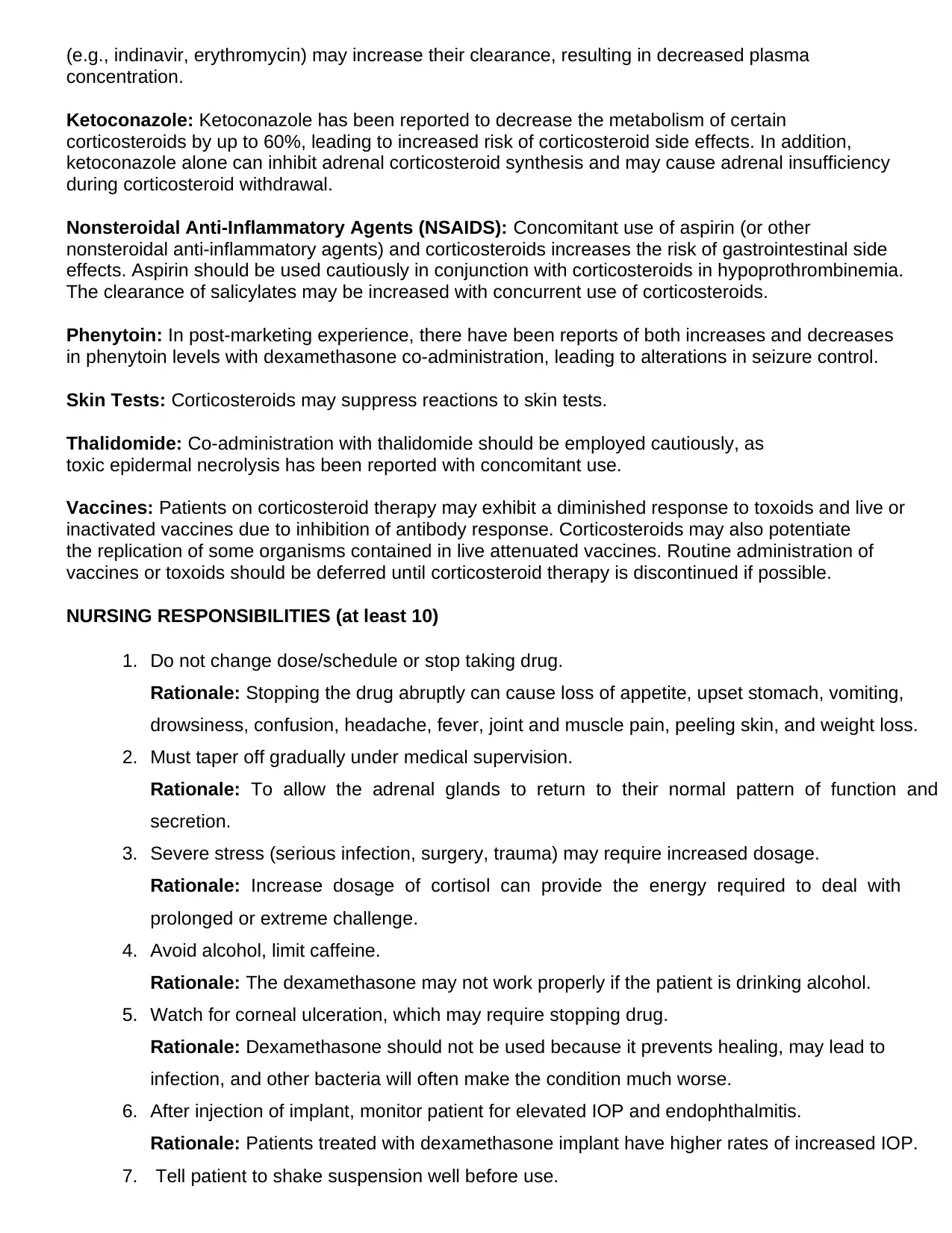
(e.g., indinavir, erythromycin) may increase their clearance, resulting in decreased plasma
concentration.
Ketoconazole: Ketoconazole has been reported to decrease the metabolism of certain
corticosteroids by up to 60%, leading to increased risk of corticosteroid side effects. In addition,
ketoconazole alone can inhibit adrenal corticosteroid synthesis and may cause adrenal insufficiency
during corticosteroid withdrawal.
Nonsteroidal Anti-Inflammatory Agents (NSAIDS): Concomitant use of aspirin (or other
nonsteroidal anti-inflammatory agents) and corticosteroids increases the risk of gastrointestinal side
effects. Aspirin should be used cautiously in conjunction with corticosteroids in hypoprothrombinemia.
The clearance of salicylates may be increased with concurrent use of corticosteroids.
Phenytoin: In post-marketing experience, there have been reports of both increases and decreases
in phenytoin levels with dexamethasone co-administration, leading to alterations in seizure control.
Skin Tests: Corticosteroids may suppress reactions to skin tests.
Thalidomide: Co-administration with thalidomide should be employed cautiously, as
toxic epidermal necrolysis has been reported with concomitant use.
Vaccines: Patients on corticosteroid therapy may exhibit a diminished response to toxoids and live or
inactivated vaccines due to inhibition of antibody response. Corticosteroids may also potentiate
the replication of some organisms contained in live attenuated vaccines. Routine administration of
vaccines or toxoids should be deferred until corticosteroid therapy is discontinued if possible.
NURSING RESPONSIBILITIES (at least 10)
1. Do not change dose/schedule or stop taking drug.
Rationale: Stopping the drug abruptly can cause loss of appetite, upset stomach, vomiting,
drowsiness, confusion, headache, fever, joint and muscle pain, peeling skin, and weight loss.
2. Must taper off gradually under medical supervision.
Rationale: To allow the adrenal glands to return to their normal pattern of function and
secretion.
3. Severe stress (serious infection, surgery, trauma) may require increased dosage.
Rationale: Increase dosage of cortisol can provide the energy required to deal with
prolonged or extreme challenge.
4. Avoid alcohol, limit caffeine.
Rationale: The dexamethasone may not work properly if the patient is drinking alcohol.
5. Watch for corneal ulceration, which may require stopping drug.
Rationale: Dexamethasone should not be used because it prevents healing, may lead to
infection, and other bacteria will often make the condition much worse.
6. After injection of implant, monitor patient for elevated IOP and endophthalmitis.
Rationale: Patients treated with dexamethasone implant have higher rates of increased IOP.
7. Tell patient to shake suspension well before use.
concentration.
Ketoconazole: Ketoconazole has been reported to decrease the metabolism of certain
corticosteroids by up to 60%, leading to increased risk of corticosteroid side effects. In addition,
ketoconazole alone can inhibit adrenal corticosteroid synthesis and may cause adrenal insufficiency
during corticosteroid withdrawal.
Nonsteroidal Anti-Inflammatory Agents (NSAIDS): Concomitant use of aspirin (or other
nonsteroidal anti-inflammatory agents) and corticosteroids increases the risk of gastrointestinal side
effects. Aspirin should be used cautiously in conjunction with corticosteroids in hypoprothrombinemia.
The clearance of salicylates may be increased with concurrent use of corticosteroids.
Phenytoin: In post-marketing experience, there have been reports of both increases and decreases
in phenytoin levels with dexamethasone co-administration, leading to alterations in seizure control.
Skin Tests: Corticosteroids may suppress reactions to skin tests.
Thalidomide: Co-administration with thalidomide should be employed cautiously, as
toxic epidermal necrolysis has been reported with concomitant use.
Vaccines: Patients on corticosteroid therapy may exhibit a diminished response to toxoids and live or
inactivated vaccines due to inhibition of antibody response. Corticosteroids may also potentiate
the replication of some organisms contained in live attenuated vaccines. Routine administration of
vaccines or toxoids should be deferred until corticosteroid therapy is discontinued if possible.
NURSING RESPONSIBILITIES (at least 10)
1. Do not change dose/schedule or stop taking drug.
Rationale: Stopping the drug abruptly can cause loss of appetite, upset stomach, vomiting,
drowsiness, confusion, headache, fever, joint and muscle pain, peeling skin, and weight loss.
2. Must taper off gradually under medical supervision.
Rationale: To allow the adrenal glands to return to their normal pattern of function and
secretion.
3. Severe stress (serious infection, surgery, trauma) may require increased dosage.
Rationale: Increase dosage of cortisol can provide the energy required to deal with
prolonged or extreme challenge.
4. Avoid alcohol, limit caffeine.
Rationale: The dexamethasone may not work properly if the patient is drinking alcohol.
5. Watch for corneal ulceration, which may require stopping drug.
Rationale: Dexamethasone should not be used because it prevents healing, may lead to
infection, and other bacteria will often make the condition much worse.
6. After injection of implant, monitor patient for elevated IOP and endophthalmitis.
Rationale: Patients treated with dexamethasone implant have higher rates of increased IOP.
7. Tell patient to shake suspension well before use.
Paraphrase This Document
Need a fresh take? Get an instant paraphrase of this document with our AI Paraphraser
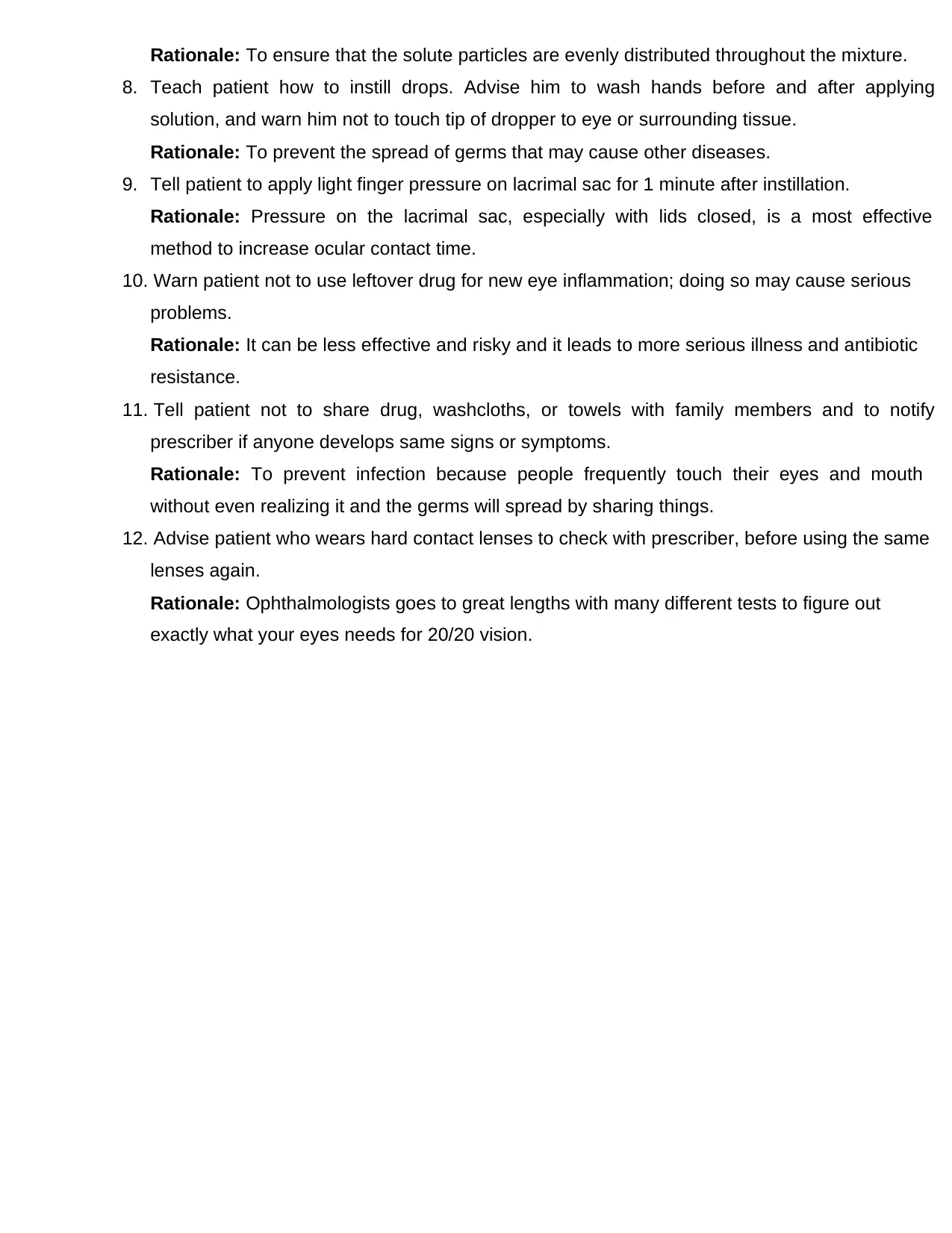
Rationale: To ensure that the solute particles are evenly distributed throughout the mixture.
8. Teach patient how to instill drops. Advise him to wash hands before and after applying
solution, and warn him not to touch tip of dropper to eye or surrounding tissue.
Rationale: To prevent the spread of germs that may cause other diseases.
9. Tell patient to apply light finger pressure on lacrimal sac for 1 minute after instillation.
Rationale: Pressure on the lacrimal sac, especially with lids closed, is a most effective
method to increase ocular contact time.
10. Warn patient not to use leftover drug for new eye inflammation; doing so may cause serious
problems.
Rationale: It can be less effective and risky and it leads to more serious illness and antibiotic
resistance.
11. Tell patient not to share drug, washcloths, or towels with family members and to notify
prescriber if anyone develops same signs or symptoms.
Rationale: To prevent infection because people frequently touch their eyes and mouth
without even realizing it and the germs will spread by sharing things.
12. Advise patient who wears hard contact lenses to check with prescriber, before using the same
lenses again.
Rationale: Ophthalmologists goes to great lengths with many different tests to figure out
exactly what your eyes needs for 20/20 vision.
8. Teach patient how to instill drops. Advise him to wash hands before and after applying
solution, and warn him not to touch tip of dropper to eye or surrounding tissue.
Rationale: To prevent the spread of germs that may cause other diseases.
9. Tell patient to apply light finger pressure on lacrimal sac for 1 minute after instillation.
Rationale: Pressure on the lacrimal sac, especially with lids closed, is a most effective
method to increase ocular contact time.
10. Warn patient not to use leftover drug for new eye inflammation; doing so may cause serious
problems.
Rationale: It can be less effective and risky and it leads to more serious illness and antibiotic
resistance.
11. Tell patient not to share drug, washcloths, or towels with family members and to notify
prescriber if anyone develops same signs or symptoms.
Rationale: To prevent infection because people frequently touch their eyes and mouth
without even realizing it and the germs will spread by sharing things.
12. Advise patient who wears hard contact lenses to check with prescriber, before using the same
lenses again.
Rationale: Ophthalmologists goes to great lengths with many different tests to figure out
exactly what your eyes needs for 20/20 vision.
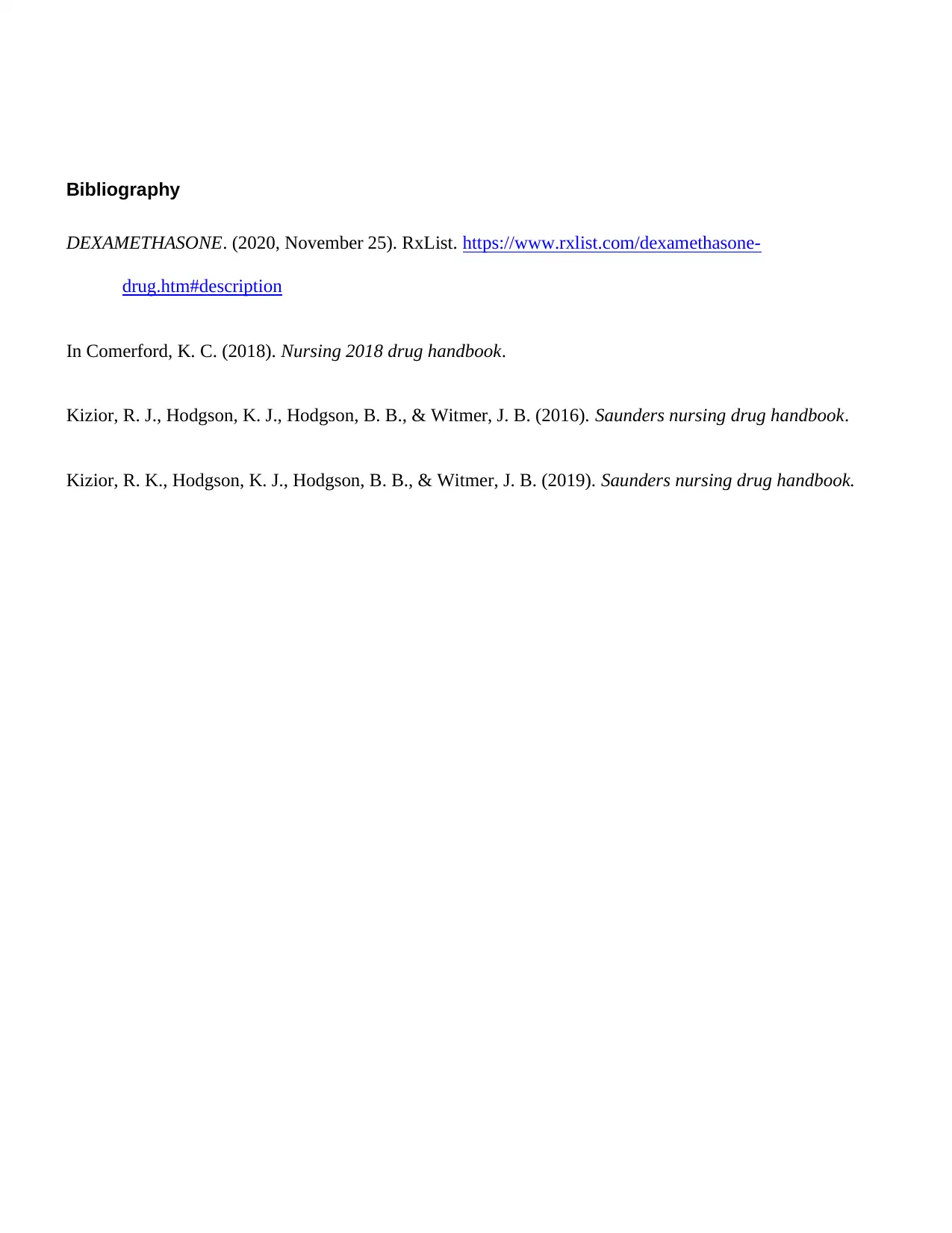
Bibliography
DEXAMETHASONE. (2020, November 25). RxList. https://www.rxlist.com/dexamethasone-
drug.htm#description
In Comerford, K. C. (2018). Nursing 2018 drug handbook.
Kizior, R. J., Hodgson, K. J., Hodgson, B. B., & Witmer, J. B. (2016). Saunders nursing drug handbook.
Kizior, R. K., Hodgson, K. J., Hodgson, B. B., & Witmer, J. B. (2019). Saunders nursing drug handbook.
DEXAMETHASONE. (2020, November 25). RxList. https://www.rxlist.com/dexamethasone-
drug.htm#description
In Comerford, K. C. (2018). Nursing 2018 drug handbook.
Kizior, R. J., Hodgson, K. J., Hodgson, B. B., & Witmer, J. B. (2016). Saunders nursing drug handbook.
Kizior, R. K., Hodgson, K. J., Hodgson, B. B., & Witmer, J. B. (2019). Saunders nursing drug handbook.
⊘ This is a preview!⊘
Do you want full access?
Subscribe today to unlock all pages.

Trusted by 1+ million students worldwide
1 out of 9
Your All-in-One AI-Powered Toolkit for Academic Success.
+13062052269
info@desklib.com
Available 24*7 on WhatsApp / Email
![[object Object]](/_next/static/media/star-bottom.7253800d.svg)
Unlock your academic potential
Copyright © 2020–2026 A2Z Services. All Rights Reserved. Developed and managed by ZUCOL.